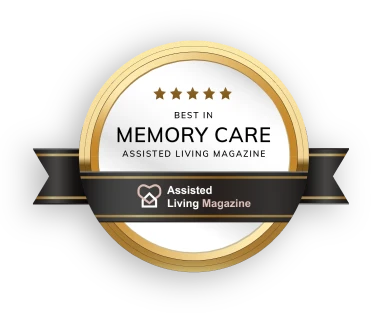A visit from a loved one might be a special and meaningful part of the day for a person with dementia. As dementia progresses, you will notice changes in people’s ability to communicate verbally due to cognitive challenges.
Trouble finding words, increased confusion, and even inappropriate behavior are all normal. Remember to keep conversation simple, and initiate it by introducing yourself at the beginning of your visit. A simple, “Hi, Mom; it’s your son, Jimmy,” can be very helpful.
Speak slowly and ask one question at a time. Give your loved one time to answer the question. If they do not respond, try again. If they continue to be unresponsive, try a different subject or introduce an activity.
Body language is an important tool for communication especially as dementia progresses. What emotions do you sense behind their words and actions? What sense are you conveying to them with your physical behavior? How can you use your posture and vocal tone to make the interaction more pleasant, calming, and clear?
Encourage non-verbal communication through pointing or gesturing when someone has difficulty expressing themselves or recalling a word. Maintain good eye contact so that you do not overlook non-verbal communication.
It’s helpful to be aware of your own feelings during the visit. If you are getting irritated, tense, or feeling rushed, it may confuse or upset someone with dementia. Take a deep breath, try to relax and take breaks when you need them.
Here are some ways to ensure that visits go as smoothly as possible:
- Plan visits at a time of day that is best for your loved one’s schedule. Morning and afternoon visits are preferable to evening visits because people generally experience more confusion in the evening.
- Bring something special to share, such as a favorite song to play, a book to read, or a photo album. A cherished object can be a useful tool for increasing socialization and participation.
- Small groups of one, two, or three visitors are ideal. They enable more genuine connection and can be less overwhelming.
- Try to partake in events and activities that do not require excessive physical activity or over-stimulating atmospheres. You and your loved one must both feel at ease.
- Avoid wearing outerwear during visits with people who cannot leave a residential care community or their home. A coat, hat, gloves, or even a pocketbook can be emotional triggers that cause your loved one to want to wander outside.
- Parting at the end of a visit can be emotionally difficult. Try to keep your mood as positive as possible. Try to use phrases such as “see you soon” or “I will be back soon” verses goodbye as the word goodbye may trigger wandering behavior.
Remember no matter how successful you feel your visit may have been, every moment with your loved one matters and tomorrow is a new day.








